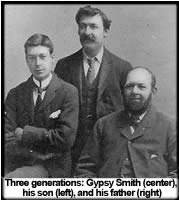 |
Gypsy
Smith (1860-1947)
His
Life and Work
By Himself
|
| Chapter
13. Hull And Derby - A Great Success And A Partial Failure |
|
My next sphere of work was Hull.
The success which we enjoyed there surpassed anything that had hitherto fallen
to my lot. The Salvation Army had two stations at Hull, one at Sculcotes and
one which was called the Ice-House. I was present, along with General Booth
and some leaders, at the opening of this second station. All the money except
£1,000 had been promised. Mr. T.A. Denny, however, offered to give £200 if the
people would raise the other £800. A deputation of local gentlemen told the
General that if they could have Gipsy Smith as their Captain, they would raise
the other £800 during his stay. By this time I had become known by the name
of Gipsy Smith. At the beginning of the work I had been advertised as "Rodney
Smith, the gipsy boy." The people talked about me as the Gipsy, and very
soon that became my popular appellation. But in order to be quite distinct from
my father and his two brothers who were always spoken of as "The Three
Converted Gipsies," I resolved to call myself "Gipsy Smith."
The General consented to the request of the local friends of the Army, and I
took charge of the Ice-House. Never before had I seen such crowds and such wonderful
results. It was quite a common thing for us to have gathered together a thousand
people who had been converted at the services, and what is perhaps even more
marvellous, an attendance of about fifteen hundred at the prayer-meeting at
seven o'clock on Sunday morning. Very often the building was filled, and the
street in which it stood, Cambridge Street, completely blocked. Many a time
I have had to get to the platform over the seats, as the aisles were so crowded
that nobody could walk up them. During the whole six months I spent in Hull
we needed two policemen at every service to manage the crowds at the doors.
Some conception of the magnitude of the work may be gained from the fact that
the Ice-House and the other branch of the Mission, which was much smaller, sold
every week 15,000 copies of The War Cry.
One of the most notable of my converts at Hull was a woman who afterwards came
to be known as "Happy Patty." Poor Patty had plunged deep into the
sink of impurity, and for eighteen years had been living a life of the foulest
sin. She came to the Ice-House and, to quote her own words, "stripped off
her old filthy rags and jumped into the fountain filled with blood, drawn from
Emmanuel's veins." She went home to her house rejoicing, but she had still
a hard battle to fight. Her former life continually kept coming back and facing
her, and she had to cut off her right arm and pluck out her right eye. The mistakes
of her life had been many, the sins of her life more, but she became a child
of God and a great force for good in Hull. Many weather-beaten seamen too were
brought to God by my ministry in that old town.
From Hull I went to Derby. I do not recall my work there with much satisfaction.
It was a partial failure. I do not say that I had no success, because there
was success, and great success, but I felt that I had not the success I ought
to have had, and certainly not the success I longed for. There were palpable
evidences of worldliness among the members of the local corps. I rebuked them
They did not like my rebukes and they did not stand by me. I fought the battle
practically single-handed, and although I had some fruit among outsiders and
great sympathy from them, my labours were not nearly so happy or so fruitful
as they had been at Hull. I became uneasy about my work, and I told the General,
taking upon myself for once to dictate to him, that I should hold my farewell
meeting on a certain date. He made no objection.
Back to Table
of Contents

